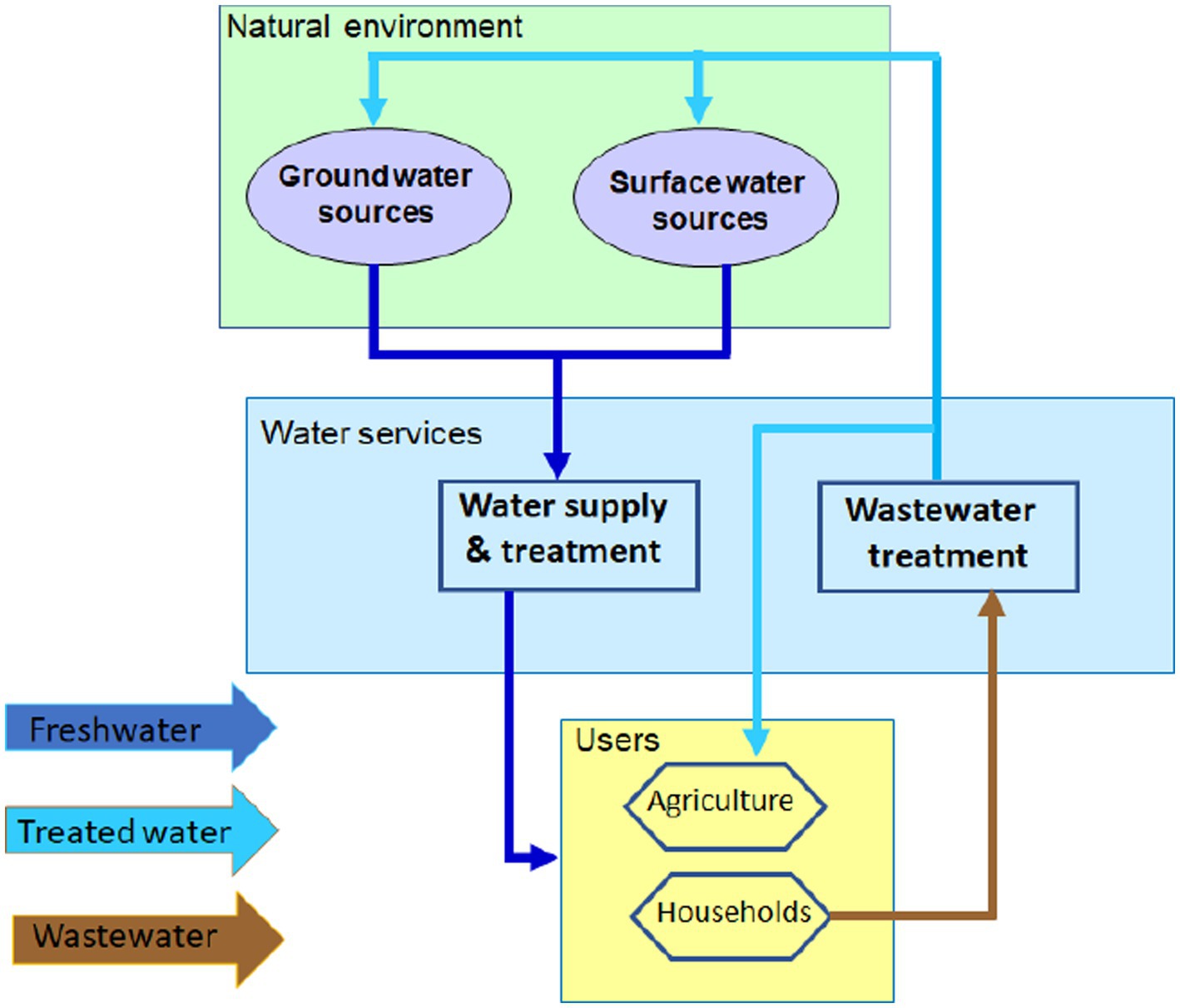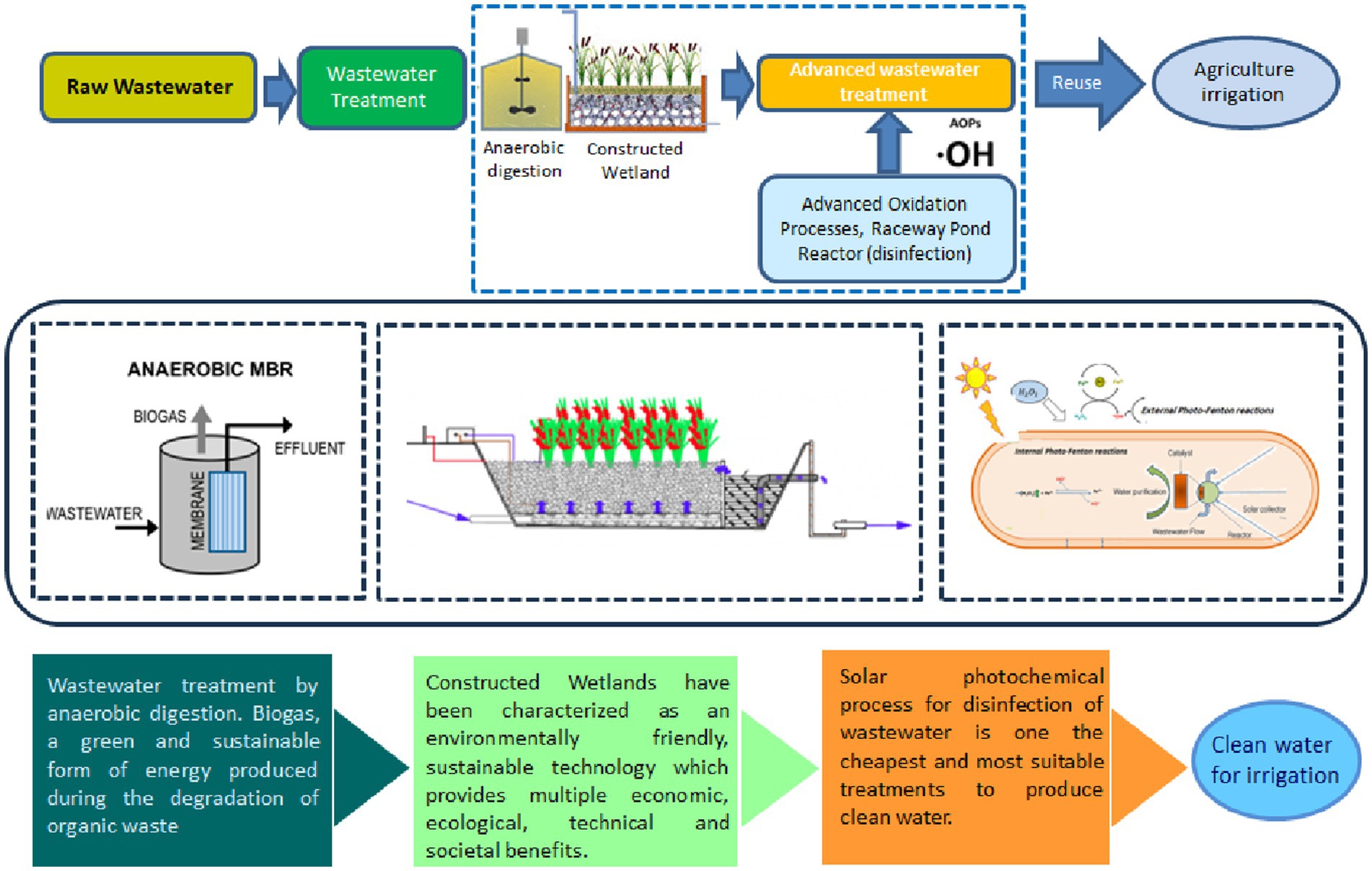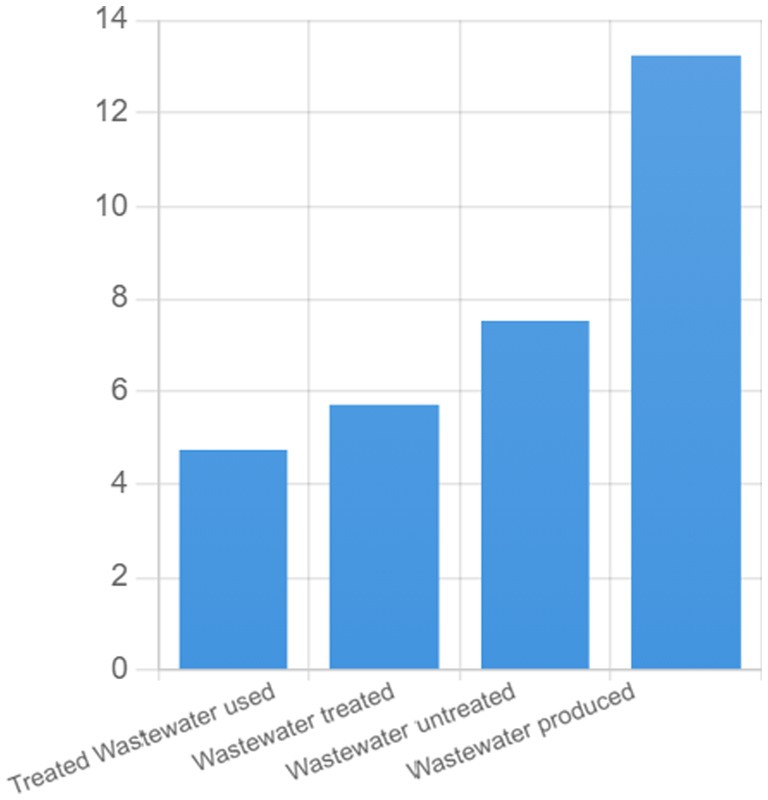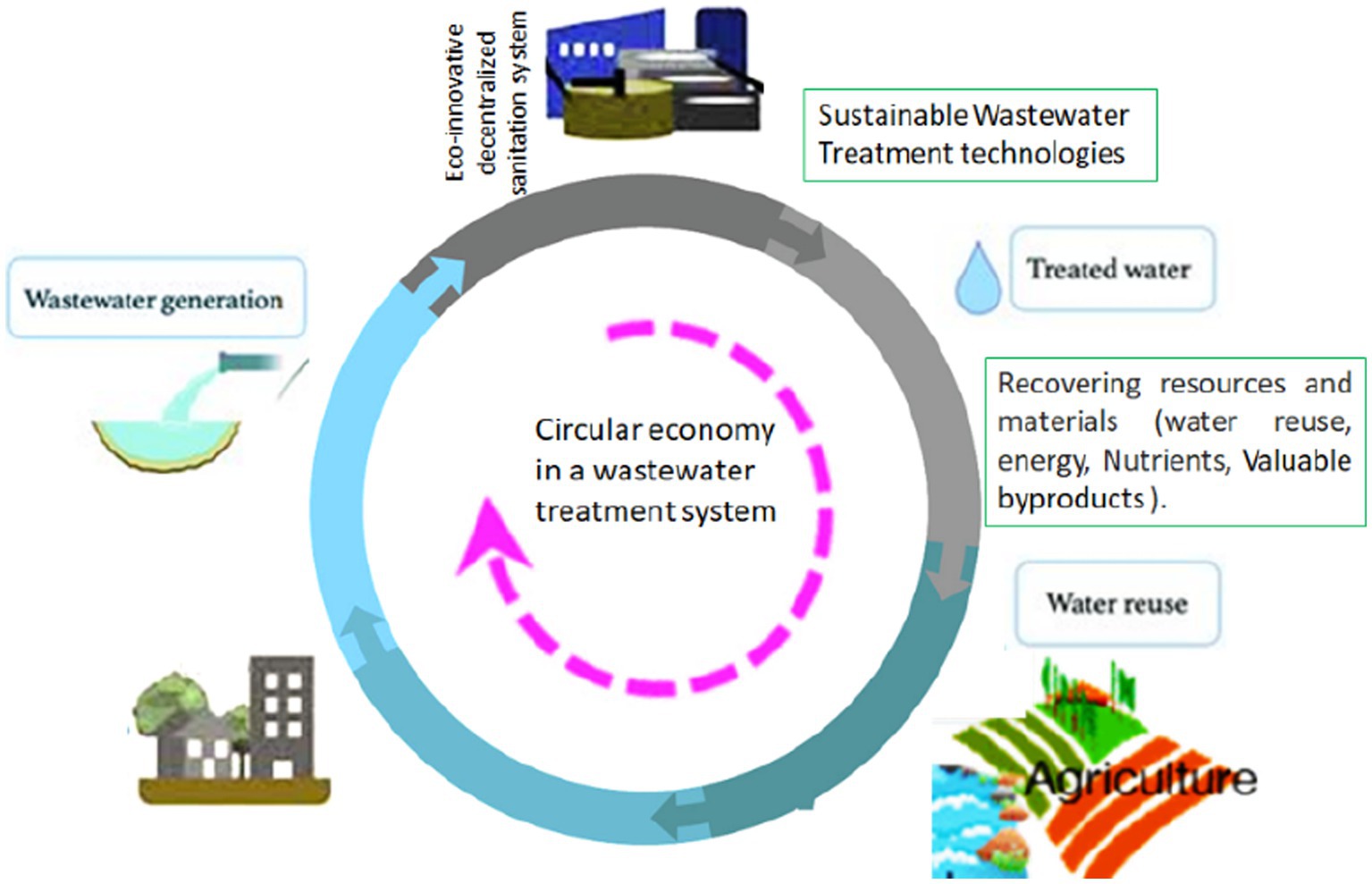- 1Faculty of Public Health S3, Lebanese University, Beirut, Lebanon
- 2Faculty of Science S3, Lebanese University, Beirut, Lebanon
- 3Doctoral School for Science and Technology, Lebanese University, Beirut, Lebanon
Water scarcity is a significant problem worldwide especially in Middle East and North Africa, to which the reuse of wastewater after appropriate treatment could offer a sustainable solution. With recent advances in wastewater treatment technologies and reuse, it is possible to obtain wastewater effluent of consistently high quality, which can then be reused in the agricultural sector. Thus, facing of water shortage, deficiency of sanitation and pollution by wastewater in the Mediterranean region, the decentralization using eco-innovative technology, focuses mainly on the wastewater treatment on-site and on the local recycling and reuse of resources contained in domestic wastewater, represents a real and well solution. Therefore, sustainable solutions for wastewater management will be discussed, with a focus on the role of innovative technology with detailed description of the wastewater treatment process. Additionally, the implications of wastewater reuse in agriculture sector in the context of the circular economy as potential solutions will also be presented in this paper.
1. Introduction
Urbanization and population growth increase the number of users and uses of water, making water resources scarcer and more polluted (Tortajada, 2020). Concurrently, the climate change, coupled with water mismanagement and overconsumption, is causing droughts and water shortages across many parts of the globe (EARTH.ORG, 2022). Due to climate change, two-thirds of mankind will face water scarcity by 2025. On the other hand, 15 million m3/day of untreated wastewater is used globally for crop irrigation, polluting the soil with pathogens, heavy metals and excess salts. Add to that, wastewater generation is expected to increase by 51% by 2050 (Water Environment Federation, 2020).
Despite the opportunities that wastewater presents, the global reality is that only a very small portion of the total wastewater produced is collected and treated, let alone harnessed for resource recovery. According to UN Water, in low-income countries, only 8% of the wastewater generated undergoes any treatment (United Nations, 2020).
To overcome water scarcity and protect the environment, a paradigm shift is needed to improve wastewater management and adopt green solutions in the water sector. This means investing in environmentally friendly technologies, recovering materials based on technological innovation and the circular economy. In addition, climate change has led to a scarcity of water resources worldwide. With the amplification of the problem of water stress, alternative solutions are therefore necessary, in particular the reuse of treated wastewater.
Thus, facing of water shortage, lack of sanitation and pollution by wastewater, it will be necessary to use a wastewater treatment system, low cost, sustainable and beneficial at the socio-economic and environmental level with the based on the principle of the circular economy.
2. Best solutions for sustainable wastewater treatment system at the local level
In the world where regions suffer from water scarcity and lack of sanitation, DEWATS offers, on the one hand, the possibility of natural, inexpensive and sustainable wastewater treatment without sewage networks and on the other hand, preserve water resources and recover treated wastewater. Hence the need to think about using the treated effluents for irrigation purposes and this is essential to maintain the sustainability of the water in the future as well as of great agronomic, environmental and economic value.
DEWATS for decentralized wastewater treatment in medium and small communities, based on the principle of low cost and not require complex maintenance and operation since most system elements operate without technical energy inputs.
The system offers the possibility of nature-based, inexpensive and sustainable wastewater treatment without sewerage especially in areas without sanitation. In addition, these systems are sanitation facilities designed to treat, reuse or dispose of wastewater at the same place where it is generated or at a very close place. They are therefore recommended to bring sanitation to the poorest regions which lack centralized water treatment systems based on a network of sewers and treatment plants (We Are Water Foundation, 2021).
Added to this, DEWATS is a modular system approach to ensuring efficient wastewater treatment performance and can be an integral part of overall wastewater treatment strategies as part of the circular economy by ensuring carbon neutrality (Gutterer et al., 2009).
There are different technologies available to treat wastewater in DEWATS. The one chosen in the project is based on the natural base solution within the framework of the circular economy and therefore it can be concluded that DEWATS can provide an appropriate and green solution for wastewater management and accelerate the achievement of the SDGs objectives.
3. Sustainable and circular management of water resources
In order to present a holistic approach to water management and build a sustainable future, the circular economy can help to conserve precious water resources, minimize waste and improve the environment in efficient way.
Accordingly, we provide the definition of the circular economy of water as an economic framework for reducing, preserving and optimizing the use of water through waste avoidance, efficient utilization and quality retention while ensuring environmental protection and conservation (Morseletto et al., 2022).
Thus, sustainable water management can provide appropriate quantity and quality of water resources allowing the functioning and protection of water ecosystems and systems dependent on water (Lorek and Lorek, 2018; China Council for International Cooperation on Environment and Development (CCICED) Secretariat, 2022).
As shown in Figures 1, 2, for the circular economy, the use of recycled water is a very positive and important part of the sustainable management of water resources (Buro Happold, 2021).

Figure 1. Descriptive diagram of the sustainable and circular management of municipal water resources.
The use of treated water and short cycles of water use, as described in Figure 2, would limit or reduce the pressure on conventional water resources.
3.1. Sustainable technology as an eco-innovative decentralized sanitation system
Wastewater treatment is a critical part of the circular water management system and offers various technological alternatives. Taking appropriate decision for the technology selection is, therefore, essential for a long-term perspective (Tortajada, 2020).
There are various technologies associated with the wastewater treatment process. The challenge is to select technologies that are eco-innovative and minimize the cost of treatment, while meeting sustainability requirements. In addition, it is necessary to integrate the sustainability analysis to facilitate an overall decision toward sustainable solutions.
In this work, we apply systems to generate a sustainable and cost-effective solution and categorizing technologies into four treatment stages (FAO, 2020).
Eco-innovative system of Wastewater treatment refers to green technology that depend on clean energies and non-toxic chemical processes, in addition to monitoring the environment to minimize the negative impacts induced by human activities. Below we describe the components of the eco-innovative technology (Aboagye et al., 2021).
Wastewater treatment is the process of removing contaminants from water through engineered physical, chemical and biological processes to produce an effluent that can be safely reused or discharged to the environment. There are four major stages of wastewater treatment. Figure 3 presents an overview of wastewater treatment process by Eco-innovative system of Wastewater treatment.

Figure 3. Sustainable treatment and reuse of wastewater relies on the eco-innovative decentralized sanitation system by adopting eco-innovative technology.
3.2. Wastewater treatment to achieving sustainability in water sector using eco-innovative decentralized sanitation system
Technological innovations play a crucial role in achieving sustainability in water sector. By using an eco-innovative system we exploring more economical for resource recovery from wastewater. In this way, wastewater becoming a valuable resource. It not only addresses water shortages through water reclamation but also provides a medium for energy and nutrient recovery, offsetting the extraction of precious resources. As we show in Figure 4 and from a circular economy perspective, energy recovery from wastewater is considered as an exceptional opportunity that brings environmental, economic, and social benefits. Moreover, wastewater treatment has demonstrated a significant capacity to produce clean water.

Figure 4. Wastewater treatment process based on sustainability in water sector and description of eco-innovative system for Wastewater treatment and reuse.
In order to achieving sustainability in water sector, the eco-innovative system for sustainable treatment and reuse of municipal wastewater has been described. As shown in Figure 4, the system is divided into 3 parts, Anaerobic digestion, Constructed wetland and disinfection by Raceway Pond Reactor.
4. Wastewater treatment and reuse in Mediterranean region
The Middle East and North Africa (MENA) is the most water-stressed region in the world (Obaideen et al., 2022).
In addition, the MENA region is projected to become a global hotspot for droughts with decreased rainfall, decreased runoff and increased evaporation by 2050 (Mateo-Sagasta et al., 2022).
These trends suggest interrelated implications leading to the intensification of the current water scarcity in the region.
This water scarcity and pollution of water resources force thousands of farmers in the MENA region to use raw or diluted wastewater for irrigation. The use of raw wastewater in agriculture has been reported in different countries in the region, although the full extent of the practice is unknown (Mateo-Sagasta et al., 2023). This situation proves the need to use sustainable wastewater treatment technologies to treat wastewater locally and also reuse it in agricultural irrigation.
Moreover, to overcome water scarcity and protect the environment, a paradigm shift is needed to improve wastewater management and adopt green solutions in the water sector. This means investing in environmentally friendly technologies, recovering materials based on technological innovation and the circular economy.
4.1. The importance of wastewater reuse for MENA region
The MENA region has 6% of the global population but only 1% of freshwater resources. The countries in the region depend on seasonal rainfall and a small number of rivers, some of which carry run-off from other countries, and often rely on fragile, and sometimes non-renewable, aquifers (Fanack Water, 2017).
On the other hand, the important challenges in the global water situation, mainly resulting from population growth and climate change, require novel innovative water technologies in order to ensure a supply of water and reduce pollution generated by wastewater (Gehrke et al., 2015).
The reuse of wastewater seems to be the most effective defense against scarcity in the Mediterranean region. This scarcity is caused by the combination of water stress, rapid population growth and climate change.
For Mediterranean countries, the solutions lie in the use of non-conventional alternative water resources such as treated wastewater instead of raw water from rivers or aquifers. Indeed, recycled wastewater is the only resource that increases at the rate of economic growth.
In any case, the purpose of water reuse is to contribute to closing the anthropogenic water cycle and to allow sustainable reuse of available water resources. It is a circular economy model that strengthens the water autonomy of countries by giving them access to a reliable resource located on their territory for agriculture irrigation. When integrated with water resources management, it can be seen as an integral part of pollution control and water management strategies (Levy et al., 2011).
4.2. Wastewater treatment in MENA region
The rate of wastewater treatment is still low in many MENA countries. Many wastewater treatment plants are poorly maintained and operate beyond the design capacity. Another point is that it is important to note that agriculture is the dominant water user in most MENA countries. On average, 86% of the water withdrawn for different water user sectors is used in crop production. The water use for household and industrial activities is 8 and 6%, respectively (Fanack Water, 2017).
Figure 5 shows clearly the difference between the volume of wastewater produced compared to the volume of untreated wastewater in the MENA region.

Figure 5. Volume of wastewater produced, disposed or used for irrigation in the MENA region (Fanack Water, 2017). X, Volume of wastewater; Y, type of wastewater effluent.
Nearly 83% of treated wastewater is used in agriculture, whereas most of the partially-treated, diluted or untreated wastewater is used by urban and peri-urban farmers to grow crops. For example, all the wastewater collected in Bahrain is treated by activated sludge and tertiary treatment processes, whereas less than 10% of the wastewater collected in Iran, Lebanon, Morocco and Libya undergoes treatment (Fanack Water, 2017).
5. Wastewater sector in Lebanon: current status, challenges, and future opportunities
Despite relatively abundant rainfall and natural water resources the water deficit in Lebanon will only be exacerbated in the upcoming years by further population growth, random urban expansion, unsustainable water usage and climate change. Furthermore, Lebanon suffers seriously and greatly when it comes to pollution. Considering water pollution in specific, the lack of proper wastewater treatment is one of the major factors affecting the quality of the country’s water.1
Total Estimated Municipal Wastewater Production at the national scale, the total available volume of municipal wastewater is estimated at 80% of domestic water consumption, in addition to commercial and industrial wastewater (Eid-Sabbagh et al., 2022). As a result, 92% of the collected wastewater are disposed of without any prior treatment into aquatic environments (Karnib, 2016).
A serious challenges face the water sector, including outdated and insufficient infrastructure, poorly managed water utilities, limited water storage, poor irrigation efficiency, and pressures on ground and surface water supplies (United States Agency for International Development, 2017).
Many communities are facing up to the urgent issue of aging infrastructure that is ill-equipped to deal with a harsher climate. They are confronting the economic anxiety of major upgrades by rethinking the status quo and leaning into technology to deliver more water sustainability (World Economic Forum, 2022).
Taking into account this situation, the decentralized wastewater treatment system allows households to recover energy in form of biogas, treated water, water for irrigation and fertilizers in the form of compost. They work essentially on decentralized solutions using appropriate technologies, tailored to local economic, social and environmental conditions, which allow them to reduce the operational cost and reduce the impact on the environment while stimulating the job creation (ENI CBC MED, 2020).
6. Reuse of treated wastewater in agricultural irrigation in Lebanon
The two main elements affecting the wastewater sector in Lebanon are:
First, the population is concentrated along the coast, resulting in a high population density and a high urbanization rate, i.e., 86%. Faced with this large percentage of the population, the total number of wastewater treatment plants along the Lebanese coast is 21 WWTPs, but the complete and operational wastewater treatment plants is only 8 WWTPs.
Secondly, the predominance of mountainous terrain over most of Lebanon and the density of constructions in areas formerly used for agricultural activities. In this important area, the complete and operational wastewater treatment plants do not exceed 14 wastewater treatment plants (Eid-Sabbagh, 2023).
On the other hand, despite relatively abundant water resources in this area, most river basins are now overexploited, water reserves are largely wasted and the majority of water surface is polluted by sewage. The agricultural sector alone consumes 60–70% of all annual freshwater diversions, with rivers and spring water providing half and groundwater sources providing the remaining part (The New Arab, 2022).
Moreover, the main sources of water for irrigation are the Litani River along the Bekaa valley and the Awali River in the south of the country. Lebanon is already using three quarters of its available water resources and the demand is still rising.
Based on this information, it can be calculated that treating already 30 percent of the available domestic untreated water to be utilized in agriculture, including forestry and agroforestry systems of urban and peri-urban areas would allow an increase of 11 percent of the available water for agriculture and forestry for environmental purposes (FAO, 2016).
Consequently, the use of recycled water in agriculture is regarded as one of the most sustainable solutions to water shortages in Lebanon, given the amount of freshwater withdrawals. In the current economic, financial and political crisis in Lebanon (ReWater MENA, 2022a).
At the local level, the recent health and environmental crisis highlights these negative effects: rivers, natural springs and groundwater aquifers are negatively affected by untreated sewage and other domestic and industrial waste that is dumped without supervision or regulation.
In fact, the multiple deficiencies of the sanitation sector in Lebanon, in terms of low rate of connection to the network, low rate of wastewater treatment and absence of a culture of exploitation and maintenance of structures, lead to a worrying situation with regard to human health and the environment.
The adoption of decentralization in the treatment of waste water brings an appropriate solution to reduce the likelihood of pollution of underground and surficial waters and also offers opportunities at all scales and presents gains in water productivity that can be derived from cross-sectoral reuse of water and wastewater to protect the health of citizens (Eid-Sabbagh et al., 2022; Drechsel et al., 2022; ReWater MENA, 2022b).
7. Conclusion
The water scarcity and potential of wastewater reuse as a resource has been discussed and then presenting an overview of recent eco-technological developments in the decentralized processing of wastewater adopting circular economy and sustainability.
The use of recycled water for agricultural irrigation is attracting increasing interest due to the drought conditions encountered in recent years in the Mediterranean region.
The eco-innovative decentralized sanitation system can reduce the demand for freshwater, reducing the pollution of water resources, and save energy and costs. Additionally, it provides nutrient-rich water for irrigation and reduces the need for chemical fertilizers.
We have shown that the treatment and reuse of treated water in the agricultural sector can contribute to solving the growing water crisis in the MENA region, such as water scarcity and wastewater pollution, then the sustainability of the water sector in the context of the circular economy.
Furthermore, the application of the use of the decentralization of treatment system will contribute to improve the management of water by implementing an eco-innovative technology and by producing recycled water for the agricultural irrigation in particular in the MENA region taking Lebanon as an example. As a result, the reclaimed water production for reuse in agricultural irrigation will help to preserve the natural environment and support socio-economic development.
Data availability statement
The raw data supporting the conclusions of this article will be made available by the authors, without undue reservation.
Author contributions
The author confirms being the sole contributor of this work and has approved it for publication.
Funding
This research was supported by the ENI CBC Med Programme under the Thematic Toward Sustainable Treatment and Reuse of Wastewater in the Mediterranean Region.
Acknowledgments
This paper has presented TOTALLY at the 3rd International Conference Strategies toward Green Deal Implementation Water, Raw Materials, and Energy, 5-7 December 2022.
Conflict of interest
The author declares that the research was conducted in the absence of any commercial or financial relationships that could be construed as a potential conflict of interest.
Publisher’s note
All claims expressed in this article are solely those of the authors and do not necessarily represent those of their affiliated organizations, or those of the publisher, the editors and the reviewers. Any product that may be evaluated in this article, or claim that may be made by its manufacturer, is not guaranteed or endorsed by the publisher.
Abbreviations
DEWATS, Decentralized Wastewater Treatment Systems; TWW, Treated wastewater; WWTPs, wastewater treatment plants; CW, Constructed Wetland; AD, Anaerobic Digestion.
Footnotes
References
Aboagye, E. A., Burnham, S. M., Dailey, J., Zia, R., Tran, C., Desai, M., et al. (2021). Systematic design, optimization, and sustainability assessment for generation of efficient wastewater treatment networks. Water 13:1326. doi: 10.3390/w13091326
China Council for International Cooperation on Environment and Development (CCICED) Secretariat (2022). “Major green technology innovation and implementation mechanisms” in Green consensus and high quality development (Singapore: Springer).
Drechsel, P., Qadir, M., and Baumann, J. (2022). Water reuse to free up freshwater for higher value use, increase climate resilience and water productivity. Irrigation and Drainage. 71, 1–10. doi: 10.1002/ird.2694
EARTH.ORG (2022). Water shortage: causes and effects, climate change, pollution, Causes of Water Pollution and How We Can Reduce It.
Eid-Sabbagh, K. (2023). Wastewater reuse in Lebanon: shedding light on hydro-social politics at multiple scales. Water Alternat. 16, 606–631.
Eid-Sabbagh, K., Roukoz, S., Nassif, M.-H., Velpuri, N., and Mateo-Sagasta, J. (2022). Analysis of water reuse potential for irrigation in Lebanon. Colombo: International Water Management Institute.
ENI CBC MED NAWAMED project: a stakeholder’s perspective of nature-based solutions for wastewater management in Lebanon (2020). enicebcmed.eu.
Fanack Water (2017). Wastewater treatment and reuse in MENA countries Fanack Water. Water of the Middle East and North Africa: Water report.
FAO (2020). Solution to water challenges in the Middle East and North Africa inter-regional technical platform on water scarcity (iRTP-WS) FAO.
Gehrke, I., Andreas, G. A., and Annette, S.-S. A. (2015). Innovations in nanotechnology for water treatment. Nanotechnol. Sci. Appl. 8, 1–17. doi: 10.2147/NSA.S43773
Gutterer, B., Sasse, L., Panzerbieter, T., and Reckerzügel, T. (2009). Decentralised wastewater treatment systems (DEWATS) and sanitation in developing countries a practical guide, WEDC Loughborough University.
Karnib, A. (2016). Assessing population coverage of safely managed wastewater systems: a case study of Lebanon. J. Water Sanit. Hyg. Dev. 6, 313–319. doi: 10.2166/washdev.2016.009
Levy, G. J., Fine, P., and Bar-Tal, A., Eds. Treated wastewater in agriculture: use and impacts on the soil environment and crops. (2011). Wiley-Blackwell, Oxford.
Lorek, E., and Lorek, A. (2018). Circular economy in sustainable water management – theory and practice. Ekonomia I Srodowisko. Poland: University of Economics in Katowice. 4, 50–59.
Mateo-Sagasta, J., Al-Hamdi, M., and AbuZeid, K. (Eds.) (2022) Water reuse in the Middle East and North Africa: a sourcebook, chap 1 context and drivers of water reuse in MENA. Colombo: International Water Management Institute.
Mateo-Sagasta, J., Nassif, M. H., Tawfik, M., Gebrezgabher, S., Mapedza, E., Lahham, N., et al. (2023). Expanding water reuse in the Middle East and North Africa: policy report. Colombo: International Water Management Institute.
Morseletto, P., Mooren, C. E., and Munaretto, S. (2022). Circular economy of water: definition, strategies and challenges. Circ. Econ. Sust. 2, 1463–1477. doi: 10.1007/s43615-022-00165-x
Obaideen, K., Shehata, N., Taha Sayed Taha, E., Ali Abdelkareem Ali, M., Mohamed, S., and Olabi, A. G. M. (2022). The role of wastewater treatment in achieving sustainable development goals (SDGs) and sustainability guideline. Energy Nexus 7:100112. doi: 10.1016/j.nexus.2022.100112
ReWater MENA (2022a). A comprehensive assessment on water reuse potential in irrigation in Lebanon ReWater MENA.
ReWater MENA (2022b). National analysis of water reuse potential in irrigation International Water Management Institute.
The New Arab (2022) in Setting the ground for water reuse policies and projects in Lebanon. ed. Rewater MENA
Tortajada, C. (2020). Contributions of recycled wastewater to clean water and sanitation sustainable development goals. npj Clean Water 3:22. doi: 10.1038/s41545-020-0069-3
United Nations UN world water development report 2020. Water and climate change, UNESCO: UN Water (2020).
United States Agency for International Development. (2017). USAID Lebanon, a global water security, sanitation, and hygiene knowledge portal Water for the World Country Plan. Global Water and Development, Report of Water and Sanitation Activities FY, USAID: U.S Agency for International Development.
Water Environment Federation Wastewater treatment and water resource recovery facilities (WRRFs) (2020). Available at: https://www.wbdg.org/
We Are Water Foundation. DEWATS: independent and sustainable sanitation. we are water foundation. (2021).
Keywords: water scarcity, water reuse, wastewater treatment, circular economy, eco-innovative technology, Mediterranean region, Lebanon
Citation: El Moll A (2023) Eco-innovative technology for wastewater treatment and reuse in MENA region: case of Lebanon. Front. Sustain. 4:1247009. doi: 10.3389/frsus.2023.1247009
Edited by:
Maris Klavins, University of Latvia, LatviaReviewed by:
Agnieszka Generowicz, Cracow University of Technology, PolandBartłomiej Macherzyński, Cardinal Stefan Wyszyński University, Poland
Copyright © 2023 El Moll. This is an open-access article distributed under the terms of the Creative Commons Attribution License (CC BY). The use, distribution or reproduction in other forums is permitted, provided the original author(s) and the copyright owner(s) are credited and that the original publication in this journal is cited, in accordance with accepted academic practice. No use, distribution or reproduction is permitted which does not comply with these terms.
*Correspondence: Ahmad El Moll, YWVsbW9sbEB1bC5lZHUubGI=
 Ahmad El Moll
Ahmad El Moll